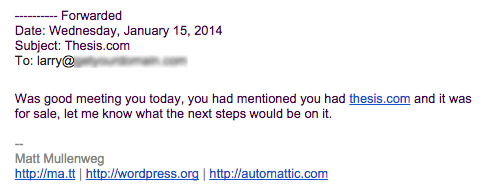We now know when Matt Mullenweg discovered Chris Pearson changed Thesis’ license from split GPL to a proprietary one. On April 1st 2014, Siobhan McKeown interviewed Matt Mullenweg for the WordPress history book.
In the interview, we learn about the history of WordPress themes, the GPL, how Automattic unintentionally created the commercial theme market, why 200 themes were removed from the directory for sponsored links and much more.
At the 30 minute mark, McKeown asks Mullenweg, at what point did he decide to go to the Software Freedom Law Center to receive clarification on if the default themes that ship with WordPress are derivatives? He responds:
I believe that was around our engagement with Mr. Pearson. I don’t know if it was before or after the Mixergy interview with our spirited online debate, but it was definitely around that time. I’m not a lawyer! I can read it and I can understand it from a logical point of view, but the Software Freedom Law Center is obviously the world experts in this and having them officially opine is the closest we can get to – it’s the next best thing to having a court case.
I was actually very excited that perhaps Chris would actually go to court, because as you know there isn’t a ton of case law around the GPL and normally, because no one is stubborn enough to actually go to court over it, and I thought, “Oh, we finally got one!” And I was looking forward to being able to discuss in the U.S. law system and provide the precedent for anyone who comes after us to protect the GPL.
Because companies like Cisco and LinkSys and huge companies with billions of dollars in resources have opted to not fight it, so you really do need someone who is going to be stubborn enough to fight it.
At the climax of the debate in 2010, some members of the WordPress community wanted to see the argument go to court so a ruling could set a precedent on when a work becomes derivative.
At the 33 minute mark, McKeown informs Mullenweg that Thesis switched from a split GPL license to a proprietary license. This is the first time since his debate with Pearson in 2010, that Mullenweg discovers Thesis switched back to a proprietary license. He responds:
I have not seen that. So we’d have to do a code analysis again. As you know the Software Freedom Law Center says that non-PHP, so non-linked code which can be CSS, images and JavaScript, isn’t required to be GPL. It doesn’t trigger the viral nature of WordPress’ GPL code.
The stance of the WordPress community was that a theme without images or CSS isn’t much of a theme so, even though something could be legally compliant, if the entire package isn’t providing the same freedoms for users it’s not something that we want to link to or promote. Because it doesn’t really follow the things that we hold dear and true in WordPress.
On January 15, 2014, Chris Pearson received a copy of Mullenweg’s inquiry into thesis.com from Larry of GetYourDomain.com. This is approximately four months prior to discovering Thesis was being sold under a proprietary license. However, the exact date in which Mullenweg obtained ownership of the domain is unknown.

The first publicly known use of the domain that confirmed Mullenweg’s ownership was on October 26th, 2014, at WordCamp San Francisco during the Question and Answer session.
As the interview continues, McKeown asks Mullenweg if he reached out to companies like Template Monster that sells WordPress themes that are not GPL Licensed. He responds:
We got in touch with everyone that we could, and it was definitely – it was a lot of time. There are times when WordPress core stuff is more than a full-time job for me and now is definitely one of them.
I see your link to a [inaudible]. There’s always ways to word licenses around multi-site support where perhaps the code is GPL but the developer chooses to not provide support for more than one site unless you buy a special license. So sometimes people interpret those to be a GPL violation when actually they’re not.
I’m not aware of what Chris has done and I’d like to think that he is supportive – he has done so well from the WordPress community that he’d be supportive of themes continuing to be GPL, especially since his business didn’t crash like he was worried it would.
McKeown jokes that lawyers might have written Thesis’ license agreement. Mullenweg responds, “Well, maybe we’ll dive back into it.” More than 14 months later, Mullenweg has dived back into it with Pearson.
It’s unclear if in this second round of arguments, Mullenweg will take Pearson to court to settle the GPL derivative argument once and for all.
[powerpress]
So it happened at the 33 minute … Thank you Jeff for this detail, it is crucial ;) So I hope we can close this junky topic now ;)